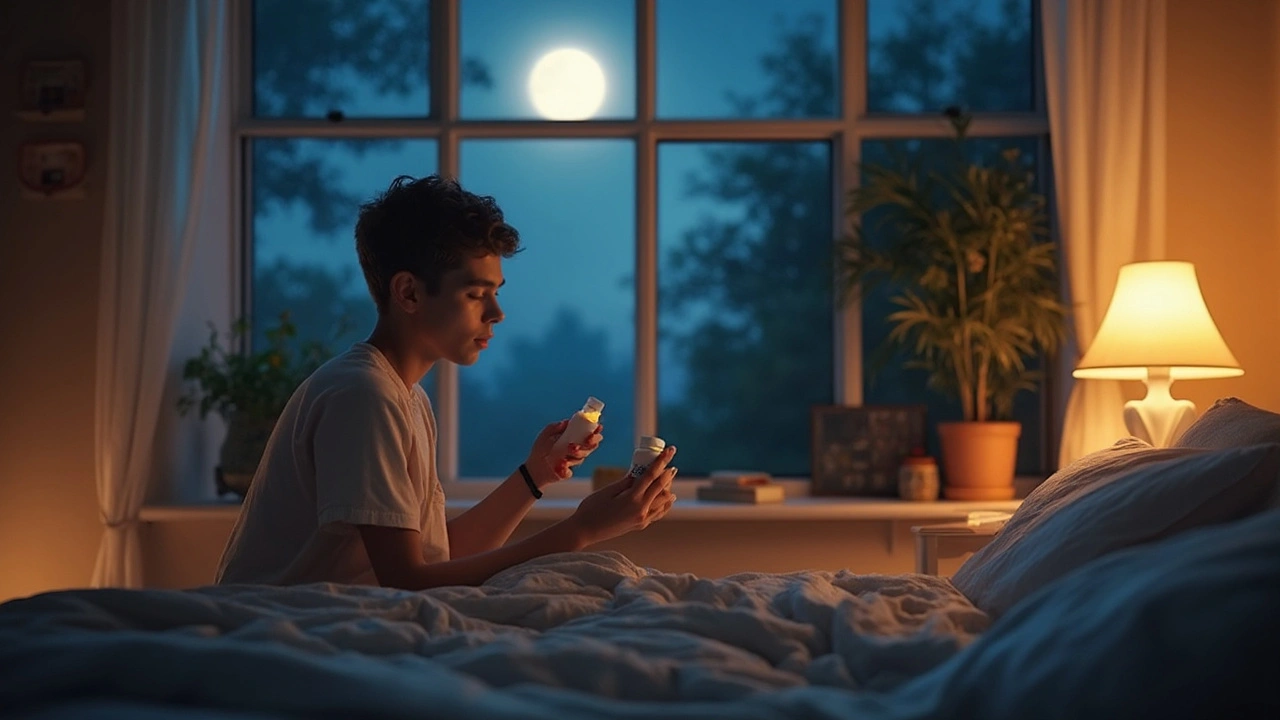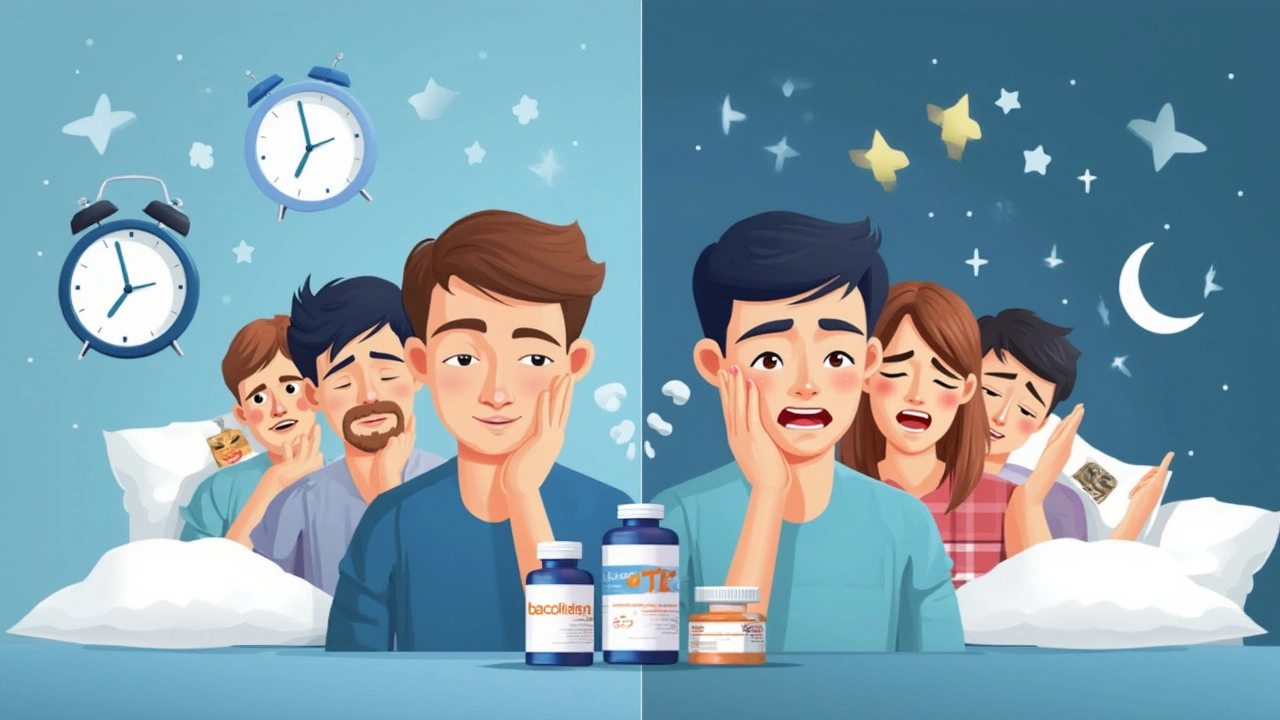
Baclofen has quietly sat on pharmacy shelves for decades, usually prescribed for muscle tightness caused by conditions such as multiple sclerosis or spinal cord injuries. What most people don’t know: researchers have been poking around its effects on sleep for years. The idea isn’t so wild when you think about it. Baclofen works in the brain by mimicking the neurotransmitter GABA—essentially, it turns down the activity in the nervous system, making muscles relax and sometimes, just maybe, coaxing a frazzled brain toward sleep. People have asked for years if this off-label effect could be harnessed for serious sleep trouble. So, what do real clinical studies say about baclofen for sleep?
Here's where things get interesting. In the late 2010s, clinical teams in Europe started to notice that some patients taking baclofen for muscle issues were reporting improvements in sleep. These weren’t just vague observations. Polysomnography (the gold standard for tracking sleep stages) began to reveal real changes—shorter sleep latency (time to fall asleep), longer total sleep time, and in some cases, improved sleep quality as measured by fewer nighttime awakenings. One 2018 study published in the Journal of Neurology, for example, showed that participants taking 10-20 mg baclofen at night fell asleep significantly faster—on average, 17 minutes sooner—compared to a placebo group. That might not sound like a big deal, but if you’ve ever stared at the ceiling at 2 a.m., you’ll know otherwise.
A big question: Do these effects hold up for folks without existing neurological conditions? The answer is surprisingly nuanced. Studies in patients dealing with alcohol withdrawal—a group notorious for brutal sleep problems—found baclofen not only curbed withdrawal symptoms but also nudged sleep patterns back toward normal. One 2021 randomized controlled trial found 42 percent of alcohol-dependent participants who took low-dose baclofen reported "deeper, less interrupted sleep" compared to 19 percent on placebo. That’s a sizable shift. Yet, for people who struggle with classic insomnia or anxiety-linked sleep problems (but don’t have muscle spasticity or withdrawal issues), the data is much thinner and far less conclusive.
Let’s get into the details. The effectiveness of baclofen for sleep ultimately comes down to three big questions: Does it help you fall asleep faster, stay asleep longer, or make sleep feel more refreshing? Here’s what research has uncovered so far, with a little help from Luna, my notoriously insomniac cat, who probably wishes she could read clinical trial abstracts at 3 a.m.
| Measure | Baclofen Group (avg.) | Placebo Group (avg.) |
|---|---|---|
| Sleep Latency | 24 min | 41 min |
| Total Sleep Time | 7.2 hrs | 6.5 hrs |
| Number of Awakenings | 2.1 | 3.3 |
| Subjective Quality | 7.4/10 | 5.8/10 |
It’s not just about numbers, though. Real life is messier. While some folks sing baclofen’s praises as their secret sleep weapon, others report next to no difference—or mention grogginess and dry mouth. Sleep medicine is always about finding the right fit, and no pill fixes every brain’s quirks.
If you’re curious about more ins-and-outs (or want a deeper scientific rabbit hole), check out this practical guide covering baclofen for sleep—it dives into recent findings, user stories, and some medical perspectives on the topic.

Baclofen hasn’t edged out the usual stars like melatonin, zolpidem, or even old-school antihistamines in the world of sleep prescriptions. So, how does it stack up? Let’s get honest—nobody should trade science for hype (or Luna’s wishful thinking). Unlike sedatives, baclofen doesn’t knock you out. Its main catch is calming muscle tension and dialing down anxious signals through GABA activation, which in some people, cascades into better sleep. If your sleep issues are pain-related or you find yourself tensing up at night, baclofen’s edge starts to shine.
But there are trade-offs. Baclofen’s side effects tend toward the annoying but not usually dangerous: dry mouth, drowsiness, mild dizziness. Taking it late in the evening means some people wake up feeling a little hungover, or just out-of-it. Quick heads-up—not a great match if you already have low blood pressure or struggle with balance. And abrupt stopping is a big no; withdrawal can be rough. Always taper under a doctor’s guidance.
With insomnia, sometimes tried-and-true treatments (like cognitive-behavioral therapy for insomnia, or CBT-I) beat any pills, hands down. For others, combining low-dose baclofen with other strategies can break the cycle that’s kept them up for years. According to Dr. Rachel Salas, a neurology sleep specialist at Johns Hopkins:
“Medications like baclofen may help those whose sleep is disrupted by discomfort or muscle tightness, but they’re not a first-line option for true insomnia. Combining behavioral therapy with any prescription tends to work best.”
Curious how baclofen compares to other sleep meds? Here’s a quick cheat sheet:
So, the big takeaway? Baclofen won’t solve chronic insomnia for everyone, but for a specific subset—especially those with pain or muscle-related sleep trouble—it could be a dark horse worth considering with your doctor.
If you’re burning the candle at both ends (like me, staring uselessly at a glowing phone at 2 a.m. with Luna on my lap), it’s tempting to try anything for better sleep—even a muscle relaxant not originally meant for it. But don’t get ahead of yourself. Baclofen works best when there’s a clear trigger: muscle pain, spasticity, or withdrawal. For regular old insomnia, especially if it’s tied to stress or shifting schedules, it might leave you underwhelmed or too drowsy to function.
If you do end up trying baclofen, please don’t stop suddenly. Weird withdrawal symptoms can pop up, even at low doses. Tapering under supervision (and taking those “slower mornings” seriously) makes the process smoother. And if it’s not working? Don’t be shy about switching tactics—what helps one person might miss the mark for the next.
Baclofen’s reputation as an under-the-radar sleep aid is very real for certain kinds of sleep troubles. The studies show promise, but no magic bullet. And as always, please remember that while the science gets better every year, your best resource is a plan personalized with your provider—one that matches your sleep quirks, lifestyle, and risks. Luna and I will be rooting for your best, deepest sleep.
Write a comment